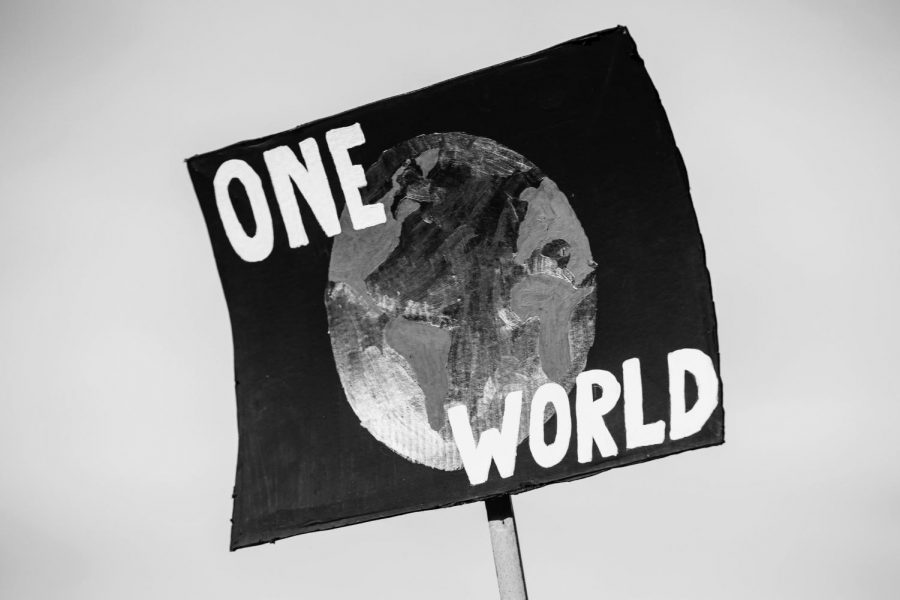Opinion: No blind eye to climate change
Big business needs to begin to pay attention to our environment before it’s too late
January 14, 2021
In the Arctic, the sea ice recedes into the land, melting, with temperatures on the rise. In the Amazon, deforestation threatens millions of species by cutting down their habitats. In the Pacific Ocean, the coral reef bleaches from acidic seawater caused by careless fishermen, devastating marine life throughout the Coral Triangle. There are many more places affected by climate change and environmental degradation but people still turn a blind eye.
Climate change is a change in global weather patterns, often attributed to increased levels of carbon dioxide emitted from fossil fuels. The term includes global warming: an increase in global temperature due to greenhouse gases. Resulting effects of climate change and other environmental destruction can include air pollution, health risks, extreme weather, and rising seas. It affects all of nature and changes the environment we’re used to.
A majority of the damage is from human error. The Natural Resources Defense Council (NRDC) explains, “In the United States, the burning of fossil fuels to make electricity is the largest source of heat-trapping pollution, producing about two billion tons of CO2 every year.” They continue to say: “Coal-burning power plants are by far the biggest polluters. The country’s second-largest source of carbon pollution is the transportation sector, which generates about 1.7 billion tons of CO2 emissions a year.” When big corporations mass produce in factories, paired with all the extra, unnecessary plastic packaging, it releases harmful chemicals into the atmosphere and damages the environment on a wide scale.
Climate change is important because it can negatively affect vigor. According to the National Oceanic and Atmospheric Administration (NOAA), these intense and sudden changes in the environment can impact our well-being. “The changing environment is expected to cause more heat stress, an increase in waterborne diseases, poor air quality, and diseases transmitted by insects and rodents,” NOAA expressed. These can pose a threat to the vulnerable human health. Weather change not only affects humans, but animals as well.
The timing of egg laying and nature blooming is shifting, and species are altering their habitats in turn. Deforestation brought on by human greed and consumption, can leave species with no shelter, forcing them to flee to unknown territory. Additionally, we leave damage to the sea as well. “The ocean absorbs about 30% of the carbon dioxide that is released into the atmosphere from the burning of fossil fuels. As a result, the ocean is becoming more acidic, affecting marine life. Rising sea levels due to thermal expansion and melting land ice sheets and glaciers put coastal areas at greater risk of erosion and storm surge,” communicated the NOAA. As bad as it is, there is still room for worse.
The Environmental Protection Agency predicts that if greenhouse gas concentrations continue to rise, the likeliness of tropical weather storms increase along with sea levels and reduce snow and ice cover. To a global extent, this would change our way of life. “These changes will impact our food supply, water resources, infrastructure, ecosystems, and even our own health,” the EPA disclosed. A big contributor to global warming is big corporations. The top 15 U.S. food and beverage companies generate almost 630 million tons of greenhouse gases annually.
Some argue that, like the Ice Age, this global change is part of a natural cycle, or rather, non-existent. However, this change in climate is developing at a much faster rate than previously. The Natural Resources Defense Council proposes, “Forces that contribute to climate change include the sun’s intensity, volcanic eruptions, and changes in naturally occurring greenhouse gas concentrations. But records indicate that today’s climatic warming—particularly the warming since the mid-20th century—is occurring much faster than ever before and can’t be explained by natural causes alone.” This acknowledges that the changes occurring aren’t normal and have a known cause other than nature.
The environment should be more protected, and we all need to work together to be more conscious of the consequences of our habits. It’s imperative to do something before the damage is irreversible. The Environmental Defenders of McHenry County have provided a couple ways to pitch in at home: “Reducing single-use anything is the way to go and composting food scraps, like veggies and other items. Having a plastic audit as well as an energy audit in one’s home is a great idea; a yard audit as well. For example, do you plant native plants that attract native bees and other pollinators? Do you use a rain barrel to capture water?” To learn more about their cause and what you can do to help, click here or here.











